The China Foundation for Poverty Alleviation has officially registered an office in the Ethiopian capital of Addis Ababa. This is the foundation’s third overseas office, after the ones it set up in Nepal and Myanmar. As the CFPA announced on its WeChat account last Friday, “the opening ceremony of the CFPA’s Ethiopian office was smoothly held in Addis Ababa on the 19th of September 2019. This activity is aimed at expanding the impact of Chinese civil society organizations in Ethiopia, encourage the foundation to cooperate in all fields with Chinese and Ethiopian organizations in the future, and help the construction of a common popular feeling along the Belt and Road.”
The opening ceremony was well-attended, with over 100 attendees including the Chinese ambassador, the CFPA’s Executive Vice President Wang Xingzui, Mercy Corps’ Vice-President Pete Lewis, and the representatives of numerous Ethiopian ministries, charities and media organizations. A boy named Nathnael Geze took the stage as a representative of a delegation of local children who benefited from the Smiling Children Project, through which the CFPA provides free meals to primary school children in Ethiopia and Sudan. At the end of the ceremony the CFPA’s Panda Pack Project (爱心包裹) was officially started in Ethiopia, with Wang Xingzui symbolically handing over a plaque for 43,000 panda packs to Muluken Fenta, director of the Ethiopian First Lady’s office, while guests distributed the panda-themed rucksacks to the students in attendance. The Panda Pack Project is the CFPA’s largest educational aid project, and it is already running in a number of countries.
The CFPA is a charity based in Beijing that was founded in the late eighties, and enjoys strong government backing. It started running projects overseas in 2005, and since then it has become one of the major Chinese organizations to do charity work internationally. In March last year CDB interviewed Wu Peng, the director of the CFPA’s department of international development. When asked about the rationale behind the establishment of local offices in Nepal and Myanmar, Mr. Wu explained that this made it easier to provide staff with a work visa, accept donations from local donors and hire local employees. He specifically mentioned that Ethiopia’s foreign exchange controls meant that local donors could not donate to CFPA’s Chinese headquarters, while the lack of a local office meant that the foundation could not accept donations in local currency. As Mr. Wu also explained, “in 2016 the state released a policy document ruling that social organizations could set up an office abroad after receiving the approval of their PSU. This policy was an answer to the urgent need of social organizations going out, and it made up for a previous gap in the regulations.” (You can read the full interview here).
 Some of the speakers at the opening ceremony stand behind a row of local children with their panda packs donated by the CFPA
Some of the speakers at the opening ceremony stand behind a row of local children with their panda packs donated by the CFPA



